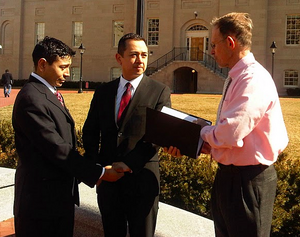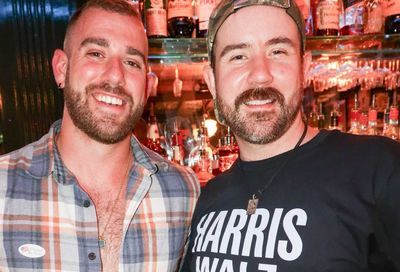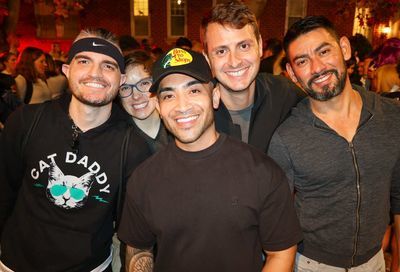Policy Change, At Least Locally, Puts Bi-National Couples’ Immigration Cases On Hold
A growing body of evidence suggests that deportations of foreign partners who are married to a same-sex partner and would otherwise be eligible for a green card are on hold, at least in some parts of the country, until immigration officials in the departments of Justice and Homeland Security assess the impact of ongoing challenges to Section 3 of the Defense of Marriage Act or perhaps until the courts can resolve those challenges.
Although no officials in either agency or at the White House responded to requests for comment today, The Daily Beast/Newsweek reported on the evening of March 25 that the heads of two of the 26 U.S. Citizenship and Immigration Service districts — those located in the District and Baltimore — have said publicly in the past week that the cases of such married same-sex couples within their districts have been put on hold. Moreover, attorney Lavi Soloway tells Metro Weekly that he is aware of at least one other case in another district in which a same-sex married couple is scheduled to have the interview that the USCIS conducts for all married couples seeking marriage-based green cards.
Soloway tells Metro Weekly in an extensive interview today that he agrees with these district heads and is cautiously optimistic that this is a new national policy — although he cautions that it is not yet clear that the policy is a national one and notes the circumstances could change if DOMA is upheld and that any couple should consult an attorney before acting on these developments.
“The most just approach [for the government] during this period is to maintain the status quo,” he says, pointing to the 10-year bar on returning to the country faced by an individual who is deported. Moreover, he sees this issue as distinct from the broader marriage debate, saying, “This isn’t about whether anybody thinks gay or lesbian couples should be able to marry. This is about whether the federal government should be discriminating between different groups of married couples.”
Over the course of the month since DOJ announced that it — and President Barack Obama — viewed sexual orientation classifications as subject to heightened scrutiny and that, accordingly, it would no longer be enforcing Section 3 of the DOMA, several developments in immigration cases appear to show that married same-sex bi-national couples could be positively impacted by the decision, whether directly or indirectly.
Soloway started raising the issue in pending cases the day after the Justice Department’s Feb. 23 decision. Were it not for Section 3 of DOMA, he argues, a U.S. citizen who is half of a same-sex bi-national married couple would be able to sponsor his or her non-citizen spouse for the purpose of obtaining a green card. DOMA, however, has regularly led to the denial of such requests, as happened with two of his clients, Josh Vandiver and Henry Velandia.
“Josh and Henry received their denial only four months after filing,” Soloway, a co-founder of Immigration Equality, says. Following that denial, Soloway took the case before the Board of Immigration Appeals (BIA), where it is now pending. Because of the Justice Department’s decision, Soloway attached the DOJ announcement, which came in the form of a letter from Attorney General Eric Holder, to the Feb. 24 BIA filing, claiming that the BIA should not be upholding denials of such applications in light of the decision by Obama and Holder that Section 3 of DOMA is unconstitutional.
 And, in the case of two bi-national couples who have brought such a claim in the month since the DOJ decision, officials within DOJ and the Department of Homeland Security — both of whom have jurisdiction over different aspect of immigration law — appear to be listening to Soloway’s argument.
And, in the case of two bi-national couples who have brought such a claim in the month since the DOJ decision, officials within DOJ and the Department of Homeland Security — both of whom have jurisdiction over different aspect of immigration law — appear to be listening to Soloway’s argument.
As Metro Weekly reported on March 9, Edwin Echegoyen and Rodrigo Martinez, who married in D.C., avoided separation because Martinez, who was due to be deported, was released under an Order of Supervision by officials with Immigration and Customs Enforcement pending the outcome of marriage-related requests to avoid deportation. Meanwhile, Monica Alcota, who is from Argentina, and Cristina Ojeda were successful in getting Alcota’s depotation proceeding adjourned by an immigration judge in New York until their marriage-based immigration case could be decided.
Following up on this anecdotal evidence, The Daily Beast/Newsweek‘s Mike Giglio reported on March 25 that “the heads of two USCIS districts—Washington, D.C. and Baltimore—informed attorneys from the advocacy group American Immigration Lawyers Association that cases in their districts involving married gay and lesbian couples would be put on hold.” Although it is not yet clear whether the policy is one reached at the district level or if it has come from higher up, the cases are being handled differently since Feb. 23 in multiple districts and Soloway is already calling the development a “game-changer” for bi-national couples seeking to avoid deportation.
“There is no other reason in the world for these changes [to be happening so quickly],” he says, other than the DOJ decision.
The importance of this development, he says, is that “[a]nybody with a pending green card application should also be eligible for employment authorization.” In this sense, he notes, “Abeyance [the legal term for putting the cases on hold] is important for people to be able to survive.”
The other significant point of this change in at least some districts’ policies is very practical in that a pending green card application will keep deportation proceedings from beginning. “When you’re not in deportation proceedings, there can be no deportation order,” he notes, which effectively means that putting the cases on hold stops the deportations. This, Soloway notes, was his aim when he started the Stop the Deportations project in 2010.
“Since the change of position by the administration on DOMA, we’ve had the opportunity to interact with immigration enforcement officials — whether that be deportation officers or immigration judges — and to bring to their attention the changing legal landscape for DOMA, and to advocate that the policy be put into place that essentially freezes cases in their status quo. Understanding, of course, that the Defense of Marriage Act remains the law of the land and we cannot achieve full equality for the bi-national couples we’re representing [until Section 3 of DOMA is repealed or struck down],” he says.
“We have been trying, with significant success, to persuade those with discretionary authority to do so, to protect couples and keep them together for an indefinite interim period while the Defense of Marriage Act makes its way to what will be its final fate, either by the Supreme Court or by the hands of Congress.”
Day by day, Soloway says, it is beginning to look like that is what is happening.
[Photo: Edwin Echegoyen, left, and Rodrigo Martinez are married in the District on March 1 (Photo provided by the DOMA Project).]
Support Metro Weekly’s Journalism
These are challenging times for news organizations. And yet it’s crucial we stay active and provide vital resources and information to both our local readers and the world. So won’t you please take a moment and consider supporting Metro Weekly with a membership? For as little as $5 a month, you can help ensure Metro Weekly magazine and MetroWeekly.com remain free, viable resources as we provide the best, most diverse, culturally-resonant LGBTQ coverage in both the D.C. region and around the world. Memberships come with exclusive perks and discounts, your own personal digital delivery of each week’s magazine (and an archive), access to our Member's Lounge when it launches this fall, and exclusive members-only items like Metro Weekly Membership Mugs and Tote Bags! Check out all our membership levels here and please join us today!




















